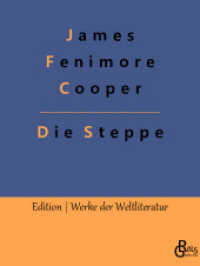- ホーム
- > 洋書
- > 英文書
- > Philosophy
基本説明
Proposes that justified belief simply is knowledge not because there is more knowledge that has been supposed, but because there are fewer justified beliefs. There are, he argues, no false justified beliefs.
Full Description
In the contentious debate among contemporary epistemologists and philosophers regarding justification, there is one consensus: justification is distinct from knowledge; there are justified beliefs that do not amount to knowledge, even if all instances of knowledge are instances of justified belief. In Without Justification, Jonathan Sutton forcefully opposes this claim. He proposes instead that justified belief simply is knowledge -- not because there is more knowledge than has been supposed, but because there are fewer justified beliefs. There are, he argues, no false justified beliefs.Sutton suggests that the distinction between justified belief and knowledge is drawn only in contemporary epistemology, and suggests furter that classic philosophers of both ancient and modern times would not have questioned the idea that justification is identical to knowledge.Sutton argues both that we do not (perhaps even cannot) have a serviceable notion of justification that is distinct from knowledge and that we do not need one. We can get by better in epistemology, he writes, without it. Sutton explores the topics of testimony and evidence, and proposes an account of these two key epistemological topics that relies on the notion of knowledge alone. He also addresses inference (both deductive and inductive), internalism versus externalism in epistemology, functionalism, the paradox of the preface, and the lottery paradox. Sutton argues that all of us--philosopher and nonphilosopher alike--should stick to what we know; we should believe something only if we know it to be so. Further, we should not believe what someone tells us unless we know that he knows what he is talking about. These views are radical, he argues, only in the context of contemporary epistemology's ill-founded distinction between knowledge and justification.
-

- 電子書籍
- 腐肉列車【タテヨミ】(92) Ruby…
-

- 洋書電子書籍
- Hell in the Heartla…






